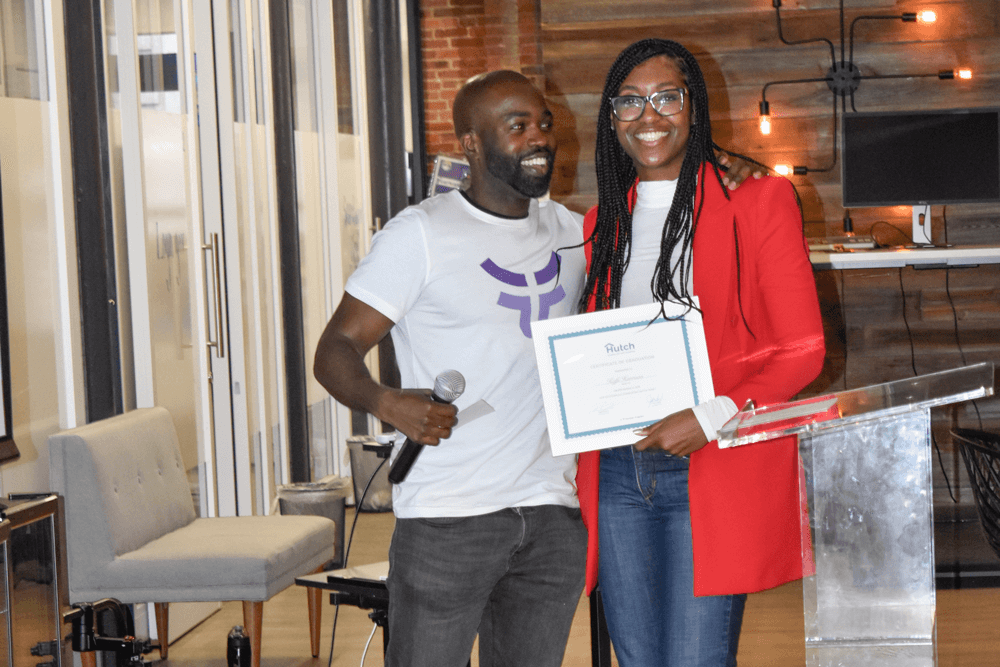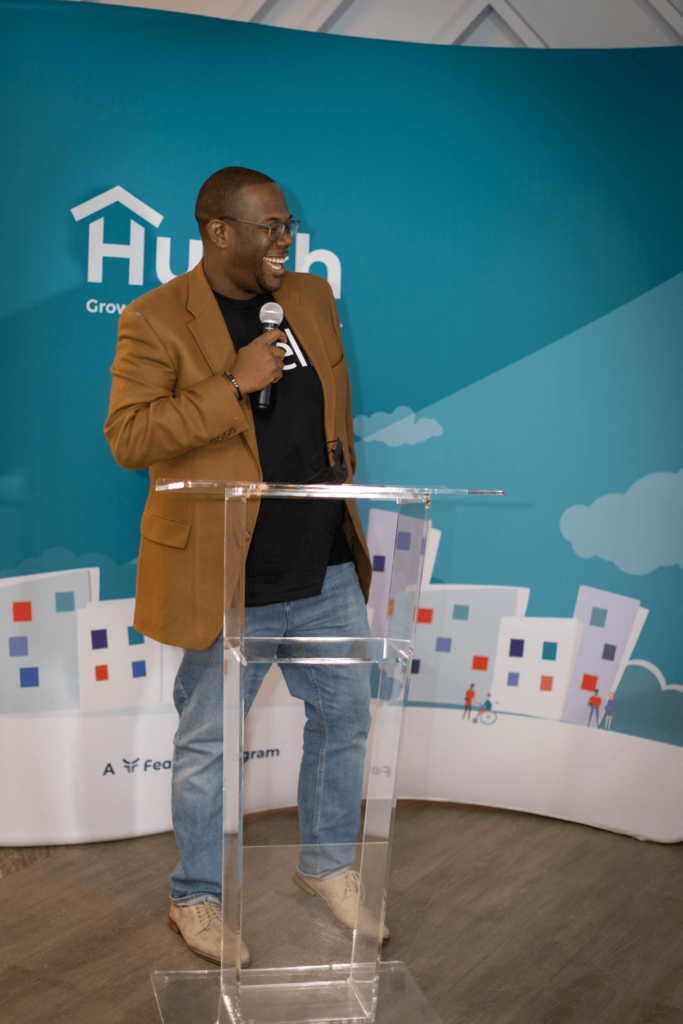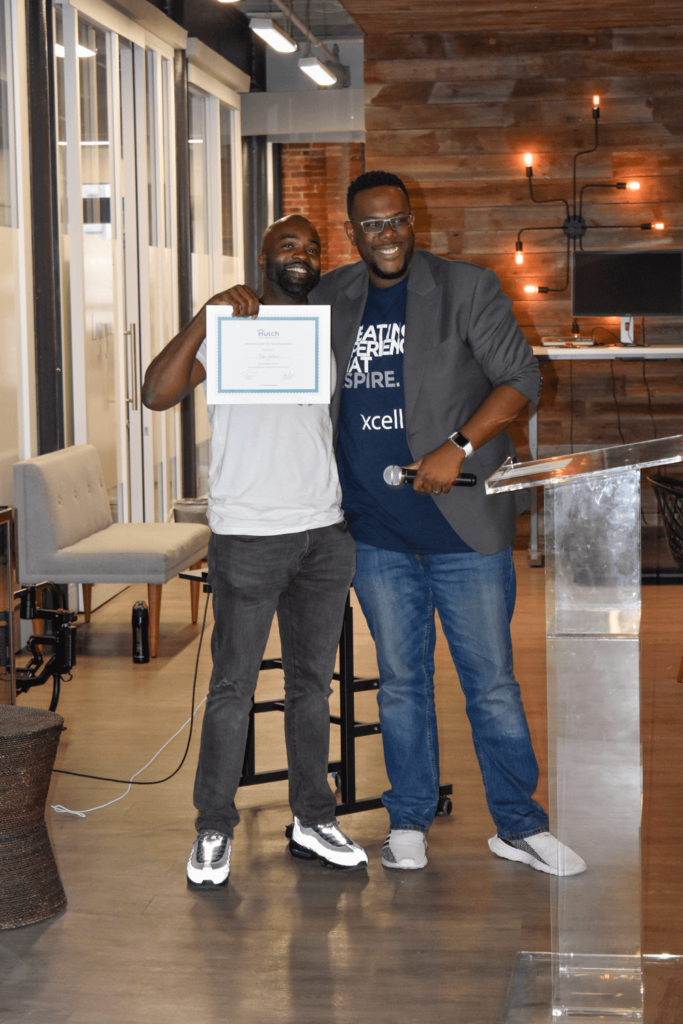And so, lifting as we climb, onward and upward we go,
struggling and striving, and hoping that the buds and
blossoms of our desires will burst into glorious fruition ‘ere
long.
– Mary Church Terrell
Starting a digital services business begins with an idea.
I’ve known Koffi Harrison for years. After a chance encounter in 2018, I learned she had an intriguing concept for a management service firm. And, I had an idea for how I could help her and other founders starting a digital services business.

Koffi is a chemical engineer by trade who, at the time, was at a crossroads.
Her mother’s breast cancer diagnosis had caused her to re-evaluate her purpose. While she was “textbook successful,” she had ideas, dreams, and aspirations to make more of an impact.
As her mother’s primary caregiver, she needed more flexibility.
So, we embarked on a journey.
A nameless idea, Koffi’s concept was initially known as “Asterisk.”
However, after only 18 months in business, her company closed in 2021 with three employees and more than $500,000 in revenue. It is now known as UpLight.
This year, she aims to hire seven to 12 employees and earn $1.5 million in revenue. And she’s planted her roots in Baltimore, where she is impacting the community.
I know, right? Let me tell you how we got here.
I’ll be the first to say that Fearless’ success is a result of early support and mentorship from larger, more established tech firms.
Without the referral of my mentor, Dr. Freeman Hrabowski, I wouldn’t have met Robert Baruch. Founder of RABA Technologies, Rob offered me my first tech job out of college.

And, it was Rob’s support after learning that I desired to own a tech firm someday that exposed me to the inner workings of government contracting early in my career.
Then, after founding Fearless in my basement, the Cyber Incubator at bwtech@UMBC Research and Technology Park welcomed me with open arms. There, I had the space to grow alongside other creators and innovators.
These early investments were pivotal in Fearless’ future success.
I stand on the shoulders of leaders who believed in my vision. Those who subscribed to my mission to build software with a soul and create a world where good software powers the things that matter.
We could not wait to meet some arbitrary benchmark of success. It was important that we reach back and bring other Black, Women, and People of Color tech startup founders with us now.
And, we needed to create an ecosystem of other digital services companies with whom we could partner as Fearless matured in portfolio, revenue, and workforce. According to CNBC, Black tech professionals make up 7.4 percent of the tech workforce. Women hold 26.7 percent of positions within the industry, but Black Women comprise a mere 1.7 percent.
This disparity offers an endless opportunity to grow the number of tech firms owned and operated by Black people, Women, and People of Color.
In turn, we hope they will be intentional in their efforts to expose youth to tech careers, as well as recruit and create opportunities for other tech professionals of color as they grow and scale.
Over the years, I have met with several founders of tech startups who would schedule meetings to pick my brain or ask for opportunities to partner. While hosting these frequent ad hoc meetings became unsustainable, I understood their tremendous value.


For instance, Felix Gilbert started XCell in 2007 while working for the federal government. But, without adequate support and proper guidance, he could not grow his business to the point that he could walk away from his nine-to-five.
Intelligent and talented, Felix knew the work but not the business. So, he eventually closed XCell and joined the Fearless team.
Fulfilled by his impact and upward mobility at Fearless, Felix was living the American dream. And, while I valued his leadership and skill, I never forgot about XCell. I knew he was not living his dream.
So, I recruited him to join Hutch’s first cohort.
In April 2021, Felix resigned from Fearless.
Today, XCell delivers services to various government entities—including the Air Force—employs three employees, and is experiencing exponential growth.
I knew there were many other tech professionals of color with experience in the industry but who needed help starting digital services businesses and entering the market.
I knew we could be their “bumper pads,” helping them make connections and navigate the world of government contracting.
After all, there is a lot to go around. In fiscal year 2020, the federal government spent more than $665 billion on contracts.
With no business name, proposal, or model, just an idea and good intentions, I reached out to some of the founders who had “picked my brain” over the years. I knew we would convene this group of like-minded entrepreneurs, but I didn’t quite know what it would look like.
Nonetheless, the urgency, necessity, and potential impact of its existence were crystal clear.
By January 2019, the Fearless team and I had recruited six businesses to trust us on this uncharted path. My executive team and I began hosting meetings with these eager founders, building content, and crafting the curriculum as we went.
While we didn’t always have the answers, we figured them out together. Not only were we helping other businesses grow, but we were testing and stretching our knowledge.

Witnessing the companies’ growth, we understood the value of this resource. But, we couldn’t continue another year without a budget and revenue stream. To pay for the underlying associated costs, each company agreed to give Fearless a five percent stake in their businesses.
This transition was not easy. Our proposal was initially met with resistance.
Remember, they had received one year of free mentorship. Now, we were asking them to relinquish five percent of their budding businesses to us.
Five percent of a dream was a lot to ask.
However, not only was it necessary to sustain the program, it was a great business lesson for the cohort. In business, all involved parties must benefit. This requires give and take, often in the form of monetary gain and investment.
But, wait! What would we call it?
At Fearless, we were producing Purple Cows, standing out in a crowd of brown cows.
Exceptional.
Unique.
Distinct.
And with this venture, we were providing specialized, individual insight and support to each of these up-and-coming businesses.
We were nurturing Purple calves.
That’s it! We’ll call it Hutch.
A hutch is used by dairy farmers to house newborn calves and tend to their individual needs.
This is precisely what we were doing—providing mentorship, support, and guidance to unique young tech companies.
That is how Hutch came to be.
An intensive 24-month program, Hutch provides underrepresented entrepreneurs with a blueprint for building successful and impactful government digital services firms.


Over that next year, we continued to guide
these companies through the inner workings of government contracting, helping them navigate the process and attempting to prevent them from experiencing some of our early pitfalls.
In November 2020, we brought on Stephanie Chin as our first program manager for Hutch. The addition of her business acumen was game-changing.
Stephanie had more than a decade of experience working with entrepreneurs and managing incubators. And she is passionate about empowering people to use their entrepreneurship for good.
Before her arrival, the Fearless team was pitching in and holding up the content, curriculum, and support for Hutch while also tending to the responsibilities associated with our respective roles within Fearless.
It was a daunting task, but seeing the growth of the startup businesses made it all worth it.
However, with Stephanie’s support, leadership, and guidance, we could do more. We became better able to meet each company where they were and help them get to each milestone more quickly than they could on their own.
While we have done much to grow and support Hutch, make no mistake—it is a mutually beneficial experience.
Hutch is made up of passionate business owners whose services will change the world for the better. Each day, we learn just as much from them as they do from us.
Proverbs 27:17 in the Bible says, “As iron sharpens iron, so one person sharpens another.”

Each business owner has unique motivations, expectations, experiences, and passions.
Therefore, we know that a one-size-fits-all approach will not be successful or sustainable. We are constantly working to ensure that everything we teach is personalized and meets each of their needs.
For instance, we eventually learned that Fearless’ five percent equity in each company was prohibitive as the founders sought out capital from banking institutions. Because of our stake in the companies, the underwriters were inquiring about Fearless’ finances.
It was not only restrictive and problematic for the companies but also for us.
We immediately acknowledged that this would not be a sustainable model as we continued to grow Hutch. So, we substituted the five percent stake for zero percent equity, a $4,000 refundable program fee, and a 10-year revenue payback rubric.
With the new model, Fearless receives five percent of the annual revenue until we receive $25,000. Next, we receive three percent of the yearly income until Fearless reaches $50,000 in total revenue from the company.
Then, Fearless receives a one percent stake for every remaining year until the company’s 10th-year anniversary of completing Hutch.
This self-motivating model allows the companies to determine how long it takes to reach the $50,000 threshold, then lock in at the one percent equity stake.
Since January 2019, nine companies have completed the two-year incubator program. Four companies are scheduled to graduate in December 2022 and another seven businesses are on target to finish in December 2023.
In January, we will welcome our fifth cohort.
Currently, we seek to include no more than ten companies
in each cohort, reserving 50 percent of those slots for Baltimore-based businesses.
We welcome founders of digital service firms who are early on in their business and looking for a return on their time commitment.
Having assessed and improved this program over the past three years, our research has determined that the two-year curriculum is most rewarding when all Hutch cohort members are already in business and at or about the same phase in their companies.
Therefore, while Koffi’s journey to start UpLight remains one of our most transformative, we no longer accept visionaries like her who have not yet started their companies.
Most importantly, each founder must commit to using their tech powers for good.
We invite companies that aim to be of service to others and impact the communities where they operate. Summer and Terry Bazemore of Eye3 Technologies, a cybersecurity and systems engineering based in Prince George’s County, Maryland, are doing just that.
Also graduates of the first Hutch cohort, the Bazemores believe in tech with purpose.
With more than 25 years of supporting the Department of Defense and other federal agencies, they provide workforce development to disengaged citizens in Baltimore, Prince George’s County, and Washington, DC.
Making an impact in the lives of others is what Hutch is all about.
Hutch is intense. Therefore, cohort members must feel comfortable leaning on those going through the process with them to be successful in the program.
Koffi, Felix, and the Bazemores were all part of our inaugural cohort, along with Aaron Brooks of MASTERMND and Shanda Wilson of INSHIFT. They all remain close.

Each Monday evening, they still meet to collaborate, share business highlights and obstacles, and discuss upcoming projects.
But, they have also become a close-knit family. They have witnessed one another’s marriages, childbirths, home purchases, and other life-changing milestones. So, their meetings often extend past the allotted hour as they catch up on personal events.
This is what makes Hutch so rewarding!
When I initially asked Koffi to join the cohort, she didn’t even have a name for her business concept. Now, she is an inaugural member of the Hutch advisory board.
Felix is still expanding XCell based on his vast network acquired through his time with Fearless and Hutch.
And, the Bazemores received their 8(a) certification as of a few weeks ago and on track to hire 11 employees.
These stories make it all worthwhile.
Hutch is one of a kind.
Now attracting digital services firms from all over the nation, Hutch will continue to grow, scale, and expand to various locations throughout the country.
As each Hutch company grows, I hope they continue to lift as they climb. I hope they too create accelerator and incubator programs like Hutch for other new tech startups trying to navigate the tech space.
This can and will be a reality.